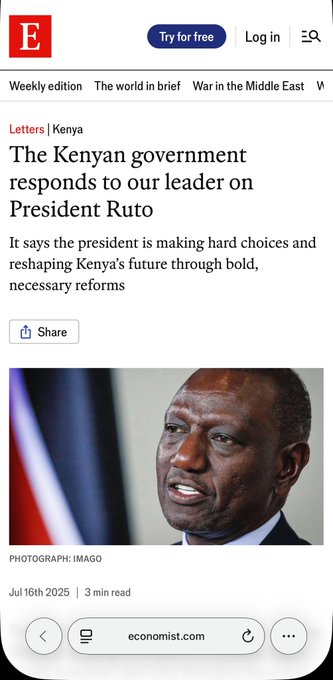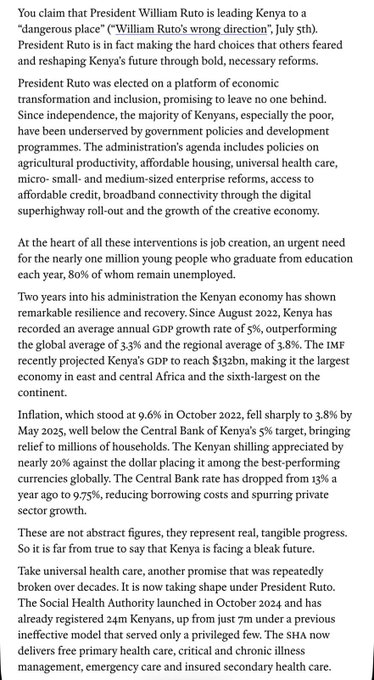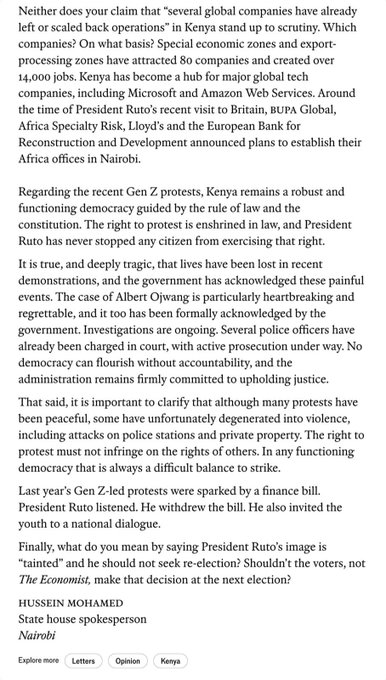NAIROBI, Kenya – President William Ruto has fired back at The Economist after the British magazine published a critical article warning that Kenya was “heading to a dangerous place” under his administration.
In a statement issued on Friday through State House Spokesperson Hussein Mohamed, Ruto dismissed the article as misleading and out of touch with Kenya’s economic realities.
“This is not danger. This is what decisive leadership looks like. It involves tough choices and deep reforms,” the President said.
He accused the publication of ignoring “the strongest economic indicators in two decades,” branding the report as either “ignorant, distorted or malicious.”
Ruto defended his administration’s record on economic reform, saying that key sectors — including agriculture, universal healthcare, affordable housing, and job creation — were already yielding results.
He framed the reforms as part of a broader agenda to lift millions of Kenyans out of poverty and prepare the youth for employment.
“These numbers don’t lie. They tell the story of an economy on the rise, not in retreat,” Ruto stated.
Right of Reply to The Economist: William Ruto is Making the Hard Choices Others Feared, and Reshaping Kenya The original text as submitted to The Economist before editorial changes is in the thread below.
Economic Indicators Tell a Different Story, Says Ruto
The President cited a string of economic milestones that, he argued, contradict The Economist’s narrative:
- GDP Growth: Kenya’s Gross Domestic Product has grown at an average of 5% since August 2022. The IMF projects it will hit KSh17 trillion by 2025 — the highest in East Africa.
- Inflation: The inflation rate dropped from 9.6% in October 2022 to 3.8% by May 2025.
- Currency Strength: The Kenyan shilling has appreciated by 20% against the US dollar during the same period.
- Cost of Borrowing: The Central Bank Rate has declined from 13% to 9.75%, lowering interest rates and easing access to credit.
“These are not random fluctuations,” Ruto said. “They are the result of intentional, well-coordinated fiscal and monetary policies.”
He also dismissed claims that international firms were leaving Kenya, challenging the magazine to name them.
“Which companies? On what grounds? A credible publication should not rely on vague claims,” he said, listing Microsoft, Apple, Amazon Web Services, and BUPA Global as among the multinationals expanding operations in the country.
On Gen Z Protests and Police Accountability
Addressing recent Gen Z-led protests that shook the country, Ruto reiterated his administration’s commitment to protecting freedom of expression.
He acknowledged the tragic killing of 30-year-old teacher Albert Ojwang and confirmed that investigations were underway, with involved officers being held accountable.
“We do not take this lightly,” he said.
The President also defended his decision to withdraw the controversial Finance Bill 2024, calling it a reflection of responsive leadership.
“We paused, listened, and responded. That is the essence of responsible governance,” he said.
Rejects Ethnic Framing and Re-Election Jabs
Ruto took issue with the article’s suggestion that his political image is “tainted” and that he may be unelectable in 2027.
“What does ‘tainted’ even mean? Who defines it? And shouldn’t the people of Kenya decide that at the ballot box?” he asked.
He also challenged the framing of current protests as uniquely non-ethnic, saying that civic activism in Kenya has for years been driven by issues, not tribe.
“Why inject ethnic undertones into what is clearly an issue-based movement? It’s unnecessary and damaging,” he said.
“Fixing the Roof Before the Storm”
Wrapping up his rebuttal, Ruto said his administration is working to fix long-standing issues in Kenya’s governance and economy — even if it comes at a political cost.
“To claim I’m leading Kenya to a dangerous place is false. We are fixing the roof now, not when the storm comes,” he said.
He ended with a direct challenge to his critics:
“For those who want power, elections are coming. Build a better plan, convince the people, and win fairly. That’s democracy.”






